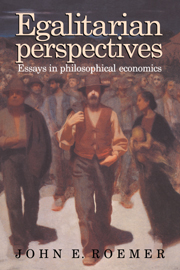Book contents
- Frontmatter
- Contents
- Acknowledgments
- List of sources
- Introduction
- Part I Exploitation
- Part II Equality of resources
- Introduction to Part II
- 6 Equality of talent
- 7 Egalitarianism, responsibility, and information
- 8 A pragmatic theory of responsibility for the egalitarian planner
- Part III Bargaining theory and justice
- Part IV Public ownership and socialism
- References
- Index
8 - A pragmatic theory of responsibility for the egalitarian planner
Published online by Cambridge University Press: 23 December 2009
- Frontmatter
- Contents
- Acknowledgments
- List of sources
- Introduction
- Part I Exploitation
- Part II Equality of resources
- Introduction to Part II
- 6 Equality of talent
- 7 Egalitarianism, responsibility, and information
- 8 A pragmatic theory of responsibility for the egalitarian planner
- Part III Bargaining theory and justice
- Part IV Public ownership and socialism
- References
- Index
Summary
Equality and responsibility
What should an egalitarian seek to equalize? Welfare is, of course, an obvious candidate, and each contributor to the recent discussion has taken it as the foil for his own proposal. To review briefly: John Rawls proposes “primary goods”; Ronald Dworkin proposes “resources,” a resource being defined in a comprehensive way to include various talents and handicaps; Amartya Sen proposes “capabilities to function”; in two recent articles, Richard Arneson has proposed “opportunity for welfare” as the appropriate equalisandum; G. A. Cohen has recently proposed “access to advantage.” All of these proposals attempt to equalize opportunities, rather than outcomes: for Rawls and Dworkin, primary goods and resources, respectively, are the wherewithal with which people carry out projects that lead to outcomes that have value to them; for Sen, the capabilities to function in various ways are the prerequisites for what individuals make of themselves; and Cohen's “access” is similar to Arneson's straightforward “opportunity.”
If the first issue of contention in modern egalitarian theory is what the equalisandum should be, the second is the distinction between a person's actions that are caused by circumstances beyond his control and those for which he is personally responsible. This issue, among the five authors named, is most actively addressed by Dworkin, Arneson, and Cohen.
- Type
- Chapter
- Information
- Egalitarian PerspectivesEssays in Philosophical Economics, pp. 179 - 196Publisher: Cambridge University PressPrint publication year: 1994
- 17
- Cited by



